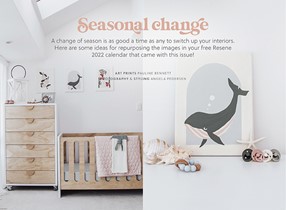Take a load off! Here's how to make the 'silly season' less silly

Christmas and summer holidays involve an enormous amount of behind the scenes effort, usually by mama. Sarah Tennant gives us her tips for making the season less silly.
Can you believe Christmas is only a few weeks away?"
Here's a little psych test for you: read that sentence out loud. Now, did you read it in the hushed tones of anticipation and wonder, or in a hiss of panicky horror?
If you've been an adult for a while, chances are it was the latter. Certainly every mother I know says it that way – equal parts "The year is gone, life is fleeting and old age approaches" and "Uhg, daycare’s going to do a dress-up party again".

Christmas, for the person who makes it happen, is not a time of peace on earth. It's a battle campaign that involves juggling numerous financial, logistical and emotional factors. It's a delicate dance of keto appetisers, relatives with un-childproofed houses, double-booked end-of-year parties, courier delays and mall parking capacities.
And the desired result? Nothing so tangible and achievable as a product, an event or even a day; just a general vibe of family togetherness, memory-making, wonder, nostalgia and delight sustained over a poorly-delineated season of time. Yikes.
It's no wonder mothers feel a slight sense of horror at hearing the first carol of the year on the radio: it's the soundtrack to chaos, the ominous leitmotif to "We forgot to bake cookies for the daycare staff".
Scientists have noticed the phenomenon. In a study by the American Psychological Association, over 60 percent of respondents said they often or sometimes felt stress and fatigue during the holidays; and these were felt more often by women than men.
Incidentally, the study's chart labelled 'Negative Holiday Emotions' also listed statistics for irritability, loneliness, sadness, anger ... and bloating. I had never previously considered bloating an emotion, but honestly, that's a solid take. And experienced by 28 percent of respondents, if you were wondering.
And arguably, that study's results are tame for Kiwis, and for 2021. Not only do we have to cope with higher shipping costs, this year we're coping with lockdown uncertainties, supply chain blockages and a postal system not designed for this kind of punishment.

Plus in New Zealand, Christmas isn't just Christmas, it's also prime getting-away-to-the-beach time. And what does that entail for dear old Mum? Packing, food prep, sunscreen application ... and the knowledge that every day at the beach is a day Christmas cards aren't going to write themselves. So is there a solution to all this angst?
DIVIDE AND CONQUER
Several studies have pointed out the obvious – that women do the lion's share of the work around Christmas; from researching gifts to washing up after the glazed ham dinner. One theoretically easy fix then, is for stressed women to ask their partners to take on some of that work.
This is a perfectly reasonable request ... possibly. Here's the catch: it's fine to share the burden of legitimate work but if you're sharing stress that you needlessly created for yourself out of Pinterest links and overcompensation, you have very possibly turned into a crazy person with no sense
of proportion.
Which is what leads to relationship tension because your partner doesn't sufficiently engage with your dilemma over gluing your gingerbread house together with royal icing (leaves visible lines, slow to dry) versus caramel (dodgy in humidity, has to be kept melted during use or it goes stringy).
And they won't. Nor will be they tear their hair out over the fact that you found six small presents for the five-year-old and three (but one big one) for the three-year-old – a combination you are convinced will cause misery and resentment for both of them.
I speak from experience. During December my husband's most frequently-used phrases are: "It'll be fine." "The kids won't notice." And "There's tons of food already, leave it and go to bed". And of course, he's right. In this instance, our most valuable division of labour is me doing the things, and him preventing me from doing so many of the things I turn into a gibbering harpy and frighten the children (which is more of a Halloween vibe and thus unseasonal).
But of course, division of labour can be more practical than that, and it isn't limited to members of your own household. Consider asking if the grandparents would like to take a few must-do activities into their own hands: taking the kids to the Christmas tree exhibition perhaps, or taking them out to buy presents for each other.
If you do daycare or kindy, check there too: maybe they've organised an activity, like meeting Santa, which you then won't have to double up on.
WIELDING TRADITION WISELY
The trouble with Christmas traditions is they tend to creep in. Especially if you have kids like mine. Their minds are steel traps when it comes to that craft or activity we did as a once-off last year, which now must be done again and forever in a self-reinforcing cycle, lest it not 'feel like' Christmas. I should never have made those first personalised Christmas crackers.
With cunning, however, you can use traditions to make your life easier. Look for things to do that are special, but also just happen to be simpler than the alternative. Maybe you have a festive sheet or two that big bulky presents are always draped in, rather than wrapping them properly. Maybe dinner every Christmas Eve is frozen dumplings from the supermarket, eaten on special festive paper plates to save on dishes. Maybe the children go to Grandma's for a sleepover every December 21st so the adults can wrap presents. Maybe you fold all the Christmas cards out of the toddler's old finger paintings.
The best tradition my family ever implemented? As far as my children know, Christmas stockings were designed to contain exclusively edible gifts. I love this tradition. One trip to the supermarket, another to the Asian grocery for whimsical-packaged snacks. Fill the stockings with bulky items such as Burger Rings and individual boxes of fancy cereal. Stuff the nooks and crannies with chocolates; and you're done. It's cheap, the kids love it, and we haven't acquired a mountain of junky toys to trip over for the next six months.
One of the most worthwhile traditions to start is separating out extended family meetups. Dragging kids, presents and side dishes from one side of the family to the other in a single day is a recipe for overstimulation, fatigue and meltdowns (not necessarily from the children).
Different families handle this differently. We do one set of in-laws on Christmas Eve, the other a few days after Christmas Day. Jessica Gabbie, who lives in Wellington, went further: she and her husband established at the beginning of their marriage that they would only visit, and exchange gifts with, one side of the family each year.
DON'T SWEAT THE FIDDLY STUFF
The Pareto Principle, or 80/20 rule, is a business and productivity rule-of-thumb based on the observation that 20 percent of a company's efforts are likely to be responsible for 80 percent of its success.
That is, it's the work directly related to a company's core focus (selling paper, for instance) that makes them most of their money; so it would be silly for them to spend most of their efforts on tangential things (say, organising charity runs and awards nights).
What does that mean for attacking Christmas? Simply that when faced with an event, you might save yourself an awful lot of stress if you focus in on the main point of the event – the thing that is going to bring 80 percent of the joy – and let the rest go.
For example, what's going to bring your toddler 80 percent of their joy at a Christmas playdate? Probably running around with their friend and eating snacks. What's not going to significantly enhance their joy? You spending five hours decorating snowman cupcakes. If they’d be just as happy with a bag of chippies, consider the effort-to-joy ratio unacceptable and ditch the cupcakes.
STRATEGISE FOR NEXT YEAR
Think about it: most stressful annual events – festivals, conferences and the like – are planned months and years in advance. They have committees, timetables, the works. If you've already arrived at the cynical stage of viewing Christmas as a stressful chore, why not go the whole hog and treat it as a challenging project demanding professional organisational strategies?
I've done various types of prep over the years: buying one present a month, for instance, or saving up a certain amount of Christmas money to offset the costs. Some people buy discounted Christmas decorations and wrapping paper after the New Year. A friend who knits homemade gifts starts knitting for next Christmas in February!
If nothing else, try to jot down ideas for presents as they come to mind throughout the year. You'll think you'll remember them ... but no.
In fact, a general Christmas notebook (or spreadsheet, if you're that way inclined) isn't a bad idea either. Note down which stocking stuffers the kids liked best, which side dishes were a pain to make, which aunt loved your homemade pickles so much at dinner that you should give her some next year. If you get a real tree, note down where you bought it from and how much it cost (is it just me, or do Christmas tree farms move about the landscape mysteriously like ents? We keep losing ours.)
And here's a thought: every year, note down a couple of cute things the kids said or did on Christmas Day. Over time you'll get a collection of anecdotes, and then in twenty years you can make personalised Christmas memory books for the children and – nope, sorry, that sounds like a real pain, you definitely don't have to do that. It's a disease, I swear.
Sarah Tennant lives in Te Awamutu with her husband and four children – Rowan (13), Miles (10), Morris (6) and Lochie (3). She makes truffles decorated like miniature Christmas puddings which take hours and aren't even that tasty. The season demands it.

AS FEATURED IN ISSUE 56 OF OHbaby! MAGAZINE. CHECK OUT OTHER ARTICLES IN THIS ISSUE BELOW

















